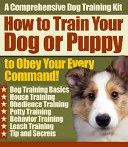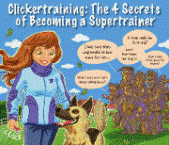Good Dog Training Advice
Get Fast & Simple Dog Training Tips to
Turn a Difficult Dog Into an Obedient Pet!
9 Dog Aggression Tips
An aggressive dog is a scary dog and in almost any household, having one just won't do. You cannot allow your
dog to control your home when you should be the active pack leader.
So, as soon as you see the signs of aggressive behaviour, use some of the following tips to cut it off
immediately.
1. Take the Alpha Position - Not always, but much of the time, a dog's aggressive
behaviour is an attempt to take control of the household, challenging you for alpha leadership. Even if your dog isn't challenging you, having
a clear pack order can make it much easier for both of you.
Step up, make clear commands, train your dog carefully and show him that you are in fact the one in charge all
of the time. Even if it doesn't get rid of dog aggressive behaviour,
it will often make it far easier to control.
2. Separate Problem Dogs - If you have more than one dog or if your dog has an issue
with this food dish, remove the issue from the dog. Two dogs that fight over food should be fed in separate
rooms. Dogs that cannot walk together should be taken out separately.
Don't worry - these are rarely permanent solutions. Rather, they work as short term stopgaps to keep from
having a more serious issue in your home.
3. Dog Obedience Training - Along the
same lines as your alpha position, it can be a good idea to send your dog to obedience training where they will
learn to follow specific commands and respect your authority.
4. Keeping Them Occupied - Some dogs grow aggressive based on their lack of things to
keep them occupied. Boredom, excess energy, a lack of focus, or simple anxiety can all lend toward aggression.
The problem is easy enough to fix. Just give your dog attention (but only when they are behaving - never
reinforce the aggression), along with enough exercise and toys to keep them busy when you're away.
5. Medical Checkup - It's unlikely, but sometimes an aggression issue can be related to
a dog's health. If your dog is ill or is simply not getting the nutrients he needs from his food, you should
consider taking him to the vet to rule out any potential illness.
6. Lots of Exercise and Good Food - Supplement all the hard work you're doing by
keeping your dog well exercised and supplied with good food. If your dog eats only the cheapest store brand dog
food, it may not be causing the aggression, but a lack of nutrients can exacerbate it.
7. Avoid Triggers - If you know something triggers aggression avoid it. Your dog might
not like children or might have issues with dogs when on a leash, or might lack the control to stay in line
when a big truck goes by. Keep him away from these negative stimuli as much as possible.
8. Reduce Fear in His Life - Fear can be a strong driving force for aggression as well.
To minimize fear in your dog's life, don't use negative punishment to curb behaviours. Correct behaviors rather
than punishing them.
Additionally, don't reinforce any existing phobias by giving your dog attention or extra care when they act
upset. This will only tell them that there is something powerful to be afraid of and that their fear is
warranted.
9. Hire a Dog Trainer - If all else fails, turn to a professional. There are many dog
trainers who are well versed in handling problem animals before something serious happens. Don't wait until
it's already too late. Contact a trainer now.
Unlike so many other dog behaviour problems, aggression is a serious concern
that should be handled immediately. It can lead to much worse behaviours, possible biting or attacks, and a
generally uncomfortable household. If your dog suffers from aggression, see to it immediately.
| |
|


Discover the Secrets to Training Your Dog Or Puppy. Huge BONUSES for a limited time only!
Click here now...
|
http://GoodDogTrainingAdvice.com





